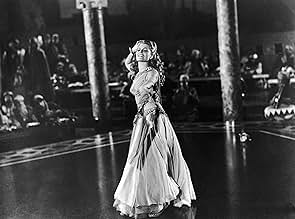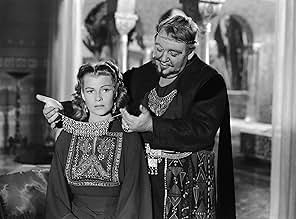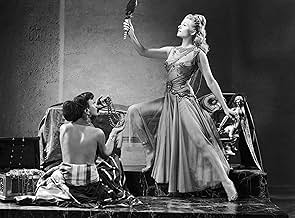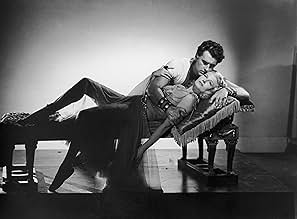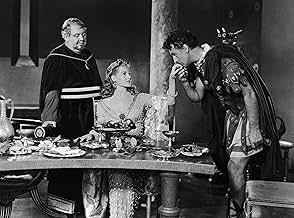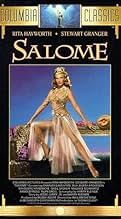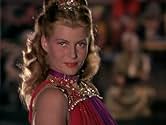CALIFICACIÓN DE IMDb
5.8/10
2.4 k
TU CALIFICACIÓN
Tras su destierro de Roma, la princesa judía Salomé regresa a su tierra natal, Galilea, gobernada por los romanos, donde el profeta Juan el Bautista predica contra los padres de Salomé, el r... Leer todoTras su destierro de Roma, la princesa judía Salomé regresa a su tierra natal, Galilea, gobernada por los romanos, donde el profeta Juan el Bautista predica contra los padres de Salomé, el rey Herodes y la reina Herodías.Tras su destierro de Roma, la princesa judía Salomé regresa a su tierra natal, Galilea, gobernada por los romanos, donde el profeta Juan el Bautista predica contra los padres de Salomé, el rey Herodes y la reina Herodías.
- Dirección
- Guionistas
- Elenco
- Premios
- 1 nominación en total
Cedric Hardwicke
- Tiberius Caesar
- (as Sir Cedric Hardwicke)
David Ahdar
- Convert
- (sin créditos)
Ray Beltram
- Herod's Council Member
- (sin créditos)
Bobker Ben Ali
- Politician
- (sin créditos)
Frederic Berest
- Sailor
- (sin créditos)
Barry Brooks
- Roman Guard
- (sin créditos)
Bruce Cameron
- Guard
- (sin créditos)
Eduardo Cansino
- Roman Guard
- (sin créditos)
Tristram Coffin
- Guard
- (sin créditos)
Bud Cokes
- Galilean Soldier
- (sin créditos)
Opiniones destacadas
Epic films based upon the Bible were popular in the 1950s, but sometimes they were only very loosely so based. "Salome" is a case in point. The "damsel" whose seductive dance before King Herod led to the execution of John the Baptist is not actually named in the New Testament, but tradition has identified her with Princess Salome, the daughter of Queen Herodias and the niece and stepdaughter of Herod. She has traditionally been painted as the ultimate Bad Girl, a wanton teenage temptress whose thoughtless cruelty led to John's death.
Well, in this film Salome is no longer a teenager but a mature beauty in her mid-thirties. (Rita Hayworth would have been 35 in 1953). More importantly, she is no longer a Bad Girl. (The studio, apparently, did not want Rita to play a villainess). To begin with, she is proud and independent-minded, but gradually softens under the influence of John's teaching and eventually converts to Christianity. (A "Salome" is numbered among Christ's followers in Mark's Gospel, but this is generally believed to have been a different person). Yes, she still gets to perform her sexy "Dance of the Seven Veils", but her motives for doing so are the precise opposite of those attributed to her in the Scriptures. In this version she is dancing in the hope that she can thereby influence the King to spare John's life.
As the film opens, Salome is living in Rome, where she has lived for most of her life. She has fallen in love with Marcellus, nephew of the Emperor Tiberius, but he forbids their marriage, not wanting a member of his family to marry a "barbarian", and exiles her back to Galilee. Once there she finds herself in a complicated political situation, made more complex by the teachings of the Baptist who condemns Herod's rule and his adulterous marriage to his brother's wife. Herodias is furious, and demands that her husband condemn the Baptist to death for treason, but he is reluctant to do so, believing that he will be cursed if he does; his reluctance makes their already unhappy marriage even more strained. In the meantime, Salome has found a new boyfriend, the handsome Roman soldier Claudius, who shares her interest in John's teaching.
Some later Biblical epics were an odd mixture of godliness and sexiness, combining an improving Christian moral with plenty of bare flesh on display. An example is "Esther and the King" in which Queen Vashti (who in the Bible is banished for refusing her husband's command to "show the people and the princes her beauty") gets into hot water for quite the opposite offence, that of showing them more of her beauty than she should by stripping down to her panties in the Royal Palace. In 1953, however, the Production Code was more rigidly enforced, so "Salome" is, on the surface at least, more godly than sexy. Hayworth's dance is really a Dance of the Six Veils, as she never removes the seventh and therefore remains fairly modestly clad to the end.
Below that surface, however, there is a lot going on. Hayworth, as lovely in her thirties as she had been a decade earlier, was gifted enough, both as an actress and as a dancer, to convey a great deal of erotic allure even when fully clothed, and although the censors could come down hard on any explicit displays of nudity, this sort of subtle sexuality was much more difficult for them to control. "Salome" is far from being Rita's greatest film (that was probably "Gilda"), but that dance is one of her greatest moments. (She later claimed it was "the most demanding of her entire career" as the director William Dieterle demanded endless retakes).
Among the other actors, the best contribution comes from Charles Laughton as the slimily lecherous Herod. Laughton had a tendency to overact, but in a role like this overacting is not necessarily a bad thing. Easily the worst comes from Alan Badel, playing John the Baptist not so much as a prophet as a swivel-eyed religious maniac, the first- century Galilean equivalent of a Hyde Park soapbox preacher. Judith Anderson is good as Herodias, but Stewart Granger is a bit wooden as Claudius, possibly because his character does not have much to do except stand around to provide a love-interest for the leading lady.
"Salome" will never, in my opinion at least, rank alongside the grand epics like "Ben-Hur" or "Spartacus"; there is too much of the smell of cheesy Hollywood sanctimoniousness about it. It does, however, have its virtues, and is certainly better than the likes of "Esther and the King", "The Silver Chalice" or "Sodom and Gomorrah", all of which do not just smell of sanctimoniousness but positively reek of it. It makes enjoyable, if undemanding, watching on a Sunday afternoon. 6/10
Some goofs. Claudius and Pontius Pilate refer to their military service in Britain, but Britain was not a Roman province during the reign of Tiberius. And whatever persuaded the scriptwriter that Gila monsters (natives of Mexico and the American South-West) are to be found in Israel?
Well, in this film Salome is no longer a teenager but a mature beauty in her mid-thirties. (Rita Hayworth would have been 35 in 1953). More importantly, she is no longer a Bad Girl. (The studio, apparently, did not want Rita to play a villainess). To begin with, she is proud and independent-minded, but gradually softens under the influence of John's teaching and eventually converts to Christianity. (A "Salome" is numbered among Christ's followers in Mark's Gospel, but this is generally believed to have been a different person). Yes, she still gets to perform her sexy "Dance of the Seven Veils", but her motives for doing so are the precise opposite of those attributed to her in the Scriptures. In this version she is dancing in the hope that she can thereby influence the King to spare John's life.
As the film opens, Salome is living in Rome, where she has lived for most of her life. She has fallen in love with Marcellus, nephew of the Emperor Tiberius, but he forbids their marriage, not wanting a member of his family to marry a "barbarian", and exiles her back to Galilee. Once there she finds herself in a complicated political situation, made more complex by the teachings of the Baptist who condemns Herod's rule and his adulterous marriage to his brother's wife. Herodias is furious, and demands that her husband condemn the Baptist to death for treason, but he is reluctant to do so, believing that he will be cursed if he does; his reluctance makes their already unhappy marriage even more strained. In the meantime, Salome has found a new boyfriend, the handsome Roman soldier Claudius, who shares her interest in John's teaching.
Some later Biblical epics were an odd mixture of godliness and sexiness, combining an improving Christian moral with plenty of bare flesh on display. An example is "Esther and the King" in which Queen Vashti (who in the Bible is banished for refusing her husband's command to "show the people and the princes her beauty") gets into hot water for quite the opposite offence, that of showing them more of her beauty than she should by stripping down to her panties in the Royal Palace. In 1953, however, the Production Code was more rigidly enforced, so "Salome" is, on the surface at least, more godly than sexy. Hayworth's dance is really a Dance of the Six Veils, as she never removes the seventh and therefore remains fairly modestly clad to the end.
Below that surface, however, there is a lot going on. Hayworth, as lovely in her thirties as she had been a decade earlier, was gifted enough, both as an actress and as a dancer, to convey a great deal of erotic allure even when fully clothed, and although the censors could come down hard on any explicit displays of nudity, this sort of subtle sexuality was much more difficult for them to control. "Salome" is far from being Rita's greatest film (that was probably "Gilda"), but that dance is one of her greatest moments. (She later claimed it was "the most demanding of her entire career" as the director William Dieterle demanded endless retakes).
Among the other actors, the best contribution comes from Charles Laughton as the slimily lecherous Herod. Laughton had a tendency to overact, but in a role like this overacting is not necessarily a bad thing. Easily the worst comes from Alan Badel, playing John the Baptist not so much as a prophet as a swivel-eyed religious maniac, the first- century Galilean equivalent of a Hyde Park soapbox preacher. Judith Anderson is good as Herodias, but Stewart Granger is a bit wooden as Claudius, possibly because his character does not have much to do except stand around to provide a love-interest for the leading lady.
"Salome" will never, in my opinion at least, rank alongside the grand epics like "Ben-Hur" or "Spartacus"; there is too much of the smell of cheesy Hollywood sanctimoniousness about it. It does, however, have its virtues, and is certainly better than the likes of "Esther and the King", "The Silver Chalice" or "Sodom and Gomorrah", all of which do not just smell of sanctimoniousness but positively reek of it. It makes enjoyable, if undemanding, watching on a Sunday afternoon. 6/10
Some goofs. Claudius and Pontius Pilate refer to their military service in Britain, but Britain was not a Roman province during the reign of Tiberius. And whatever persuaded the scriptwriter that Gila monsters (natives of Mexico and the American South-West) are to be found in Israel?
While this film does vary from the biblical storyline, it's worth watching for Rita alone. She's a vision in all her scenes and very good in her part, culminating in her 'Dance of the Seven Veils', which is a treasure. {I only wish it wasn't montaged with the death of the Baptist.} Rita never looked lovelier than she does here and her Jean Louis costumes are all drop-dead gorgeous. Stewart Granger is pretty good, better than usual, he and Rita having good chemistry here. It's well cast, with actors Charles Laughton and Dame Judith Anderson both excellent as King Herod and Queen Herodias. Arnold Moss is slithering as the evil adviser to Queen Herodias, though Alan Badel as John the Baptist seems more like a wild-eyed madman than a holy prophet. Though there are some filler segments that are not up to the rest of the film, still I think it's excellent entertainment.
I just finished watching this movie. I think it has been unfairly rundown by critics. Yes it is historically inaccurate, but how many Hollywood epics are actually accurate ? The answer is hardly any.
To me movies are essentially entertainment, and this movie really did that. Most of this was down to the casting of the stunningly beautiful Rita Hayworth in the title role. Her much mentioned "dance of the seven veils" is without a doubt the highlight of this film.
The performances by the rest of the cast are decent if not exceptional. Stewart Granger is the Roman commander who is secretly a Christian, Charles Laughton plays Herod, a man as much obsessed with pursuing Salome as with trying to spare John the Baptist for fear of what God will do to him in retaliation (he believes John the Baptist to be the Messiah).
It is definitely not one of the greatest epics and some of the dialogue is not the best, but the movie is certainly not the worst of Hollywoods many Biblical epics. It is far more entertaining than "The Robe" and Rita Hayworth's radiance is extremely easy on the eye.
To me movies are essentially entertainment, and this movie really did that. Most of this was down to the casting of the stunningly beautiful Rita Hayworth in the title role. Her much mentioned "dance of the seven veils" is without a doubt the highlight of this film.
The performances by the rest of the cast are decent if not exceptional. Stewart Granger is the Roman commander who is secretly a Christian, Charles Laughton plays Herod, a man as much obsessed with pursuing Salome as with trying to spare John the Baptist for fear of what God will do to him in retaliation (he believes John the Baptist to be the Messiah).
It is definitely not one of the greatest epics and some of the dialogue is not the best, but the movie is certainly not the worst of Hollywoods many Biblical epics. It is far more entertaining than "The Robe" and Rita Hayworth's radiance is extremely easy on the eye.
The reason why you 'd like to sit through this is the four leads:Rita Hayworth ,ideally cast as Salome ,a libidinous Charles Laughton ,a cruel Judith Anderson and a noble Stewart Granger.Plus a stint by Sir Cedric Hardwicke.Plus the director of the best version of "hunchback of Notre -Dame" at his kitchiest.Plus a fabulous dance of the seven veils.Plus gaudy colors and John the Baptist's head of course.
But what remains,eg the essential ,is a really "free' adaptation of the holy writs.The script writers invented a Roman soldier with whom Salome falls in love.BUT what will puzzle the Christians is that Salome dances not to get John's head,but to save him!!!.A happy end which will remind you of your Sunday school days.And that's not all:the plot even involves Pontius Pilate whom Claudius (Granger) urged to become a Christian and to repent so that he would go down in history as a soldier of a brand new religion.Well the man did not wash his hands ,but he did not do what he was told either...which did not prevent him from going down in history anyway..
But what remains,eg the essential ,is a really "free' adaptation of the holy writs.The script writers invented a Roman soldier with whom Salome falls in love.BUT what will puzzle the Christians is that Salome dances not to get John's head,but to save him!!!.A happy end which will remind you of your Sunday school days.And that's not all:the plot even involves Pontius Pilate whom Claudius (Granger) urged to become a Christian and to repent so that he would go down in history as a soldier of a brand new religion.Well the man did not wash his hands ,but he did not do what he was told either...which did not prevent him from going down in history anyway..
Although other films from the same period might be expected to receive a higher priority because they remain more significant today, it seems amazing that this film has never been released as a DVD. Salome is highly viewable, and anyone simply wanting to pass an evening by watching a light entertaining film without regard to its message or social significance would probably find it an excellent choice. Such films are among the most successful in video rental stores or as casual purchases from store displays - consequently they bring in the greatest returns for companies creating new DVD's from old films and are often selected in preference to much more significant works.
What does Salome have going for it?. Firstly a good Technicolor print of the type which provides endlessly enjoyable images of the seas, skies and scenery so plentiful in the Mediterranean. Next a very popular duration of around 100 minutes, a story which is widely known and a one word title equally readily recognised. Thirdly a cast largely composed of great Hollywood stars of the period - a major selling point usually far more important than the filmscript, direction or historical accuracy; and finally an electrifying near striptease performance by a star who has been referred to as the Hollywood love goddess of the period. To set against all this were the very poor reviews by most critics who condemned it for gross overacting, poor dialogue, unimaginative direction and historical inaccuracy - all of which experience suggests is of less importance than the cast for most viewers (even those who study the critics), when they are simply looking for an enjoyable and relaxing evening.
Furthermore some of these criticisms are not easily sustained. 'Overacting' is a qualitative term which first became important when the introduction of talkies in the 1930's made the exaggerated actions and gestures of the silent era no longer necessary. Stage actors are trained to overact so the distant members of their audience seated far away 'up in the gods' can better follow what is going on. Done carefully this type of overacting can be very effective in films with rather melodramatic story lines, and is often referred to as 'chewing up the scenery'. There is a lot of this in Salome, not only from John the Baptist but also from both Herod and Herodias. Watching Charles Laughton, as a very lecherous Herod, lasciviously rolling his eyes and drooling at the mouth when Salome dances is one of the great joys of this film. It is true that Rita Hayworth was probably too old to play a character historically believed to have been so much younger, and she certainly did not look the part of a Semitic princess, but she was trained as a dancer from infancy and it is unlikely that the film would have the same appeal today if any other Hollywood star of the period had been given the role.
Historical inaccuracies are much more controversial. I take a very strong objection to incorrect representations of what is factually established history unless it is made clear that this is being done. Here however historical records seem to be rather limited and not entirely self consistent, so some judgment is called for. Most of what we believe we know about Salome probably comes from records that are more literary than historical. For hundreds of years much current literature comprised re-writing and fleshing out known stories which might have originated as oral history, legend, myth or pure fiction. In this case an additional complication is that the most widely known contemporary reference come from the Bible rather than from a work solely written as history - something that often leads to public reactions based more on emotion than on fact. Herod, Herodias and Herodias's daughter are well authenticated historical characters, but doubts have even been raised as to whether the latter was actually named Salome (some sources refer to her having the same name as her mother). History points to her age at the time as being 13 or 14 but this is by inference rather than definite records. The account of Salome dancing before Herod occupies about 200 words in each of the gospels of Mark and Matthew in the Bible. There is also a brief historical record of this dance and its outcome written by the Roman-Jewish historian Josephus. The story in this film reverses the biblical story which indicates that Salome had no idea what reward to seek from Herod after dancing for him, but at the request of her mother agreed to ask for John's head. The reversal was demanded by a Columbia Studio head who did not want his star tagged with the label of a very bad girl, but historically it can also be found in Jules Massenet's opera "Herodiade". In a film intended purely as a piece of entertainment this reversal would be justifiable artistic licence so long as the change from the normally accepted story was clearly indicated. Since this was not done, the film has been mercilessly but rather unfairly shredded by critics and viewers ever since. Nobody today would view it to learn the story and for those merely seeking an enjoyable evening's viewing, it is inconsequential. If a similar film had depicted a legend about which little was known historically, there would have been much less controversy and, despite all its faults, the film would probably have remained much more highly regarded right up to today (with copies on DVD readily available in almost every video store). Anyone who wishes to view a more structured reconstruction of this story should watch the fine Ken Russell film based on the play by Oscar Wilde (or even Nazimova's 1923 silent film), but for an evening's light, enjoyable entertainment without heavy psychological musings choose this 1953 film.
What does Salome have going for it?. Firstly a good Technicolor print of the type which provides endlessly enjoyable images of the seas, skies and scenery so plentiful in the Mediterranean. Next a very popular duration of around 100 minutes, a story which is widely known and a one word title equally readily recognised. Thirdly a cast largely composed of great Hollywood stars of the period - a major selling point usually far more important than the filmscript, direction or historical accuracy; and finally an electrifying near striptease performance by a star who has been referred to as the Hollywood love goddess of the period. To set against all this were the very poor reviews by most critics who condemned it for gross overacting, poor dialogue, unimaginative direction and historical inaccuracy - all of which experience suggests is of less importance than the cast for most viewers (even those who study the critics), when they are simply looking for an enjoyable and relaxing evening.
Furthermore some of these criticisms are not easily sustained. 'Overacting' is a qualitative term which first became important when the introduction of talkies in the 1930's made the exaggerated actions and gestures of the silent era no longer necessary. Stage actors are trained to overact so the distant members of their audience seated far away 'up in the gods' can better follow what is going on. Done carefully this type of overacting can be very effective in films with rather melodramatic story lines, and is often referred to as 'chewing up the scenery'. There is a lot of this in Salome, not only from John the Baptist but also from both Herod and Herodias. Watching Charles Laughton, as a very lecherous Herod, lasciviously rolling his eyes and drooling at the mouth when Salome dances is one of the great joys of this film. It is true that Rita Hayworth was probably too old to play a character historically believed to have been so much younger, and she certainly did not look the part of a Semitic princess, but she was trained as a dancer from infancy and it is unlikely that the film would have the same appeal today if any other Hollywood star of the period had been given the role.
Historical inaccuracies are much more controversial. I take a very strong objection to incorrect representations of what is factually established history unless it is made clear that this is being done. Here however historical records seem to be rather limited and not entirely self consistent, so some judgment is called for. Most of what we believe we know about Salome probably comes from records that are more literary than historical. For hundreds of years much current literature comprised re-writing and fleshing out known stories which might have originated as oral history, legend, myth or pure fiction. In this case an additional complication is that the most widely known contemporary reference come from the Bible rather than from a work solely written as history - something that often leads to public reactions based more on emotion than on fact. Herod, Herodias and Herodias's daughter are well authenticated historical characters, but doubts have even been raised as to whether the latter was actually named Salome (some sources refer to her having the same name as her mother). History points to her age at the time as being 13 or 14 but this is by inference rather than definite records. The account of Salome dancing before Herod occupies about 200 words in each of the gospels of Mark and Matthew in the Bible. There is also a brief historical record of this dance and its outcome written by the Roman-Jewish historian Josephus. The story in this film reverses the biblical story which indicates that Salome had no idea what reward to seek from Herod after dancing for him, but at the request of her mother agreed to ask for John's head. The reversal was demanded by a Columbia Studio head who did not want his star tagged with the label of a very bad girl, but historically it can also be found in Jules Massenet's opera "Herodiade". In a film intended purely as a piece of entertainment this reversal would be justifiable artistic licence so long as the change from the normally accepted story was clearly indicated. Since this was not done, the film has been mercilessly but rather unfairly shredded by critics and viewers ever since. Nobody today would view it to learn the story and for those merely seeking an enjoyable evening's viewing, it is inconsequential. If a similar film had depicted a legend about which little was known historically, there would have been much less controversy and, despite all its faults, the film would probably have remained much more highly regarded right up to today (with copies on DVD readily available in almost every video store). Anyone who wishes to view a more structured reconstruction of this story should watch the fine Ken Russell film based on the play by Oscar Wilde (or even Nazimova's 1923 silent film), but for an evening's light, enjoyable entertainment without heavy psychological musings choose this 1953 film.
¿Sabías que…?
- TriviaThis was the last movie produced by Rita Hayworth's production company, the Beckworth Company. Hayworth later called her "Dance of the Seven Veils" in this movie, "the most demanding of my entire career", and said it required "endless takes and retakes."
- ErroresIn Palestine, Claudius saves Salome from a gila monster, a venomous lizard found only in southwestern North America.
- Citas
Queen Herodias: The desperate can only survive by taking desperate measures.
- Créditos curiososAt the end of the picture, rather than seeing the words The End on the screen, we see a title that says This was The Beginning.
- ConexionesEdited into Hércules y los tres chiflados (1962)
Selecciones populares
Inicia sesión para calificar y agrega a la lista de videos para obtener recomendaciones personalizadas
- How long is Salome?Con tecnología de Alexa
Detalles
- Tiempo de ejecución1 hora 43 minutos
- Relación de aspecto
- 1.37 : 1
Contribuir a esta página
Sugiere una edición o agrega el contenido que falta

Principales brechas de datos
By what name was Salomé (1953) officially released in India in English?
Responda

